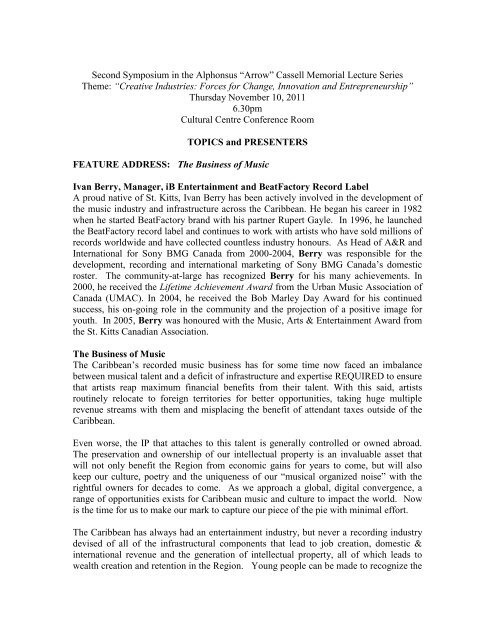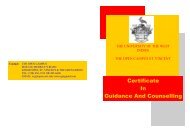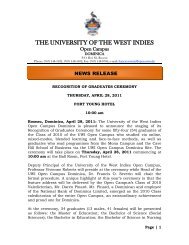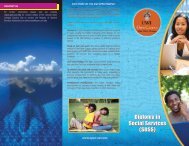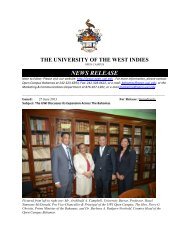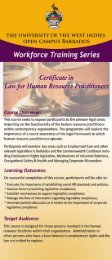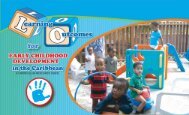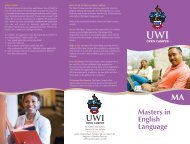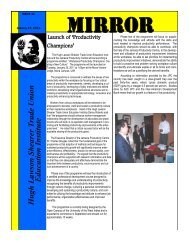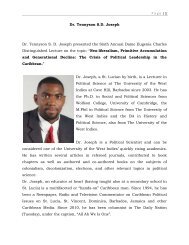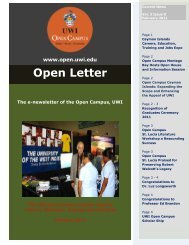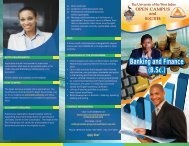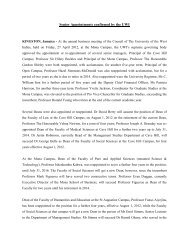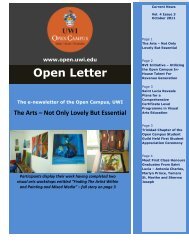2011 Symposium Topics - The University of the West Indies - Open ...
2011 Symposium Topics - The University of the West Indies - Open ...
2011 Symposium Topics - The University of the West Indies - Open ...
Create successful ePaper yourself
Turn your PDF publications into a flip-book with our unique Google optimized e-Paper software.
Second <strong>Symposium</strong> in <strong>the</strong> Alphonsus “Arrow” Cassell Memorial Lecture Series<strong>The</strong>me: “Creative Industries: Forces for Change, Innovation and Entrepreneurship”Thursday November 10, <strong>2011</strong>6.30pmCultural Centre Conference RoomTOPICS and PRESENTERSFEATURE ADDRESS: <strong>The</strong> Business <strong>of</strong> MusicIvan Berry, Manager, iB Entertainment and BeatFactory Record LabelA proud native <strong>of</strong> St. Kitts, Ivan Berry has been actively involved in <strong>the</strong> development <strong>of</strong><strong>the</strong> music industry and infrastructure across <strong>the</strong> Caribbean. He began his career in 1982when he started BeatFactory brand with his partner Rupert Gayle. In 1996, he launched<strong>the</strong> BeatFactory record label and continues to work with artists who have sold millions <strong>of</strong>records worldwide and have collected countless industry honours. As Head <strong>of</strong> A&R andInternational for Sony BMG Canada from 2000-2004, Berry was responsible for <strong>the</strong>development, recording and international marketing <strong>of</strong> Sony BMG Canada’s domesticroster. <strong>The</strong> community-at-large has recognized Berry for his many achievements. In2000, he received <strong>the</strong> Lifetime Achievement Award from <strong>the</strong> Urban Music Association <strong>of</strong>Canada (UMAC). In 2004, he received <strong>the</strong> Bob Marley Day Award for his continuedsuccess, his on-going role in <strong>the</strong> community and <strong>the</strong> projection <strong>of</strong> a positive image foryouth. In 2005, Berry was honoured with <strong>the</strong> Music, Arts & Entertainment Award from<strong>the</strong> St. Kitts Canadian Association.<strong>The</strong> Business <strong>of</strong> Music<strong>The</strong> Caribbean’s recorded music business has for some time now faced an imbalancebetween musical talent and a deficit <strong>of</strong> infrastructure and expertise REQUIRED to ensurethat artists reap maximum financial benefits from <strong>the</strong>ir talent. With this said, artistsroutinely relocate to foreign territories for better opportunities, taking huge multiplerevenue streams with <strong>the</strong>m and misplacing <strong>the</strong> benefit <strong>of</strong> attendant taxes outside <strong>of</strong> <strong>the</strong>Caribbean.Even worse, <strong>the</strong> IP that attaches to this talent is generally controlled or owned abroad.<strong>The</strong> preservation and ownership <strong>of</strong> our intellectual property is an invaluable asset thatwill not only benefit <strong>the</strong> Region from economic gains for years to come, but will alsokeep our culture, poetry and <strong>the</strong> uniqueness <strong>of</strong> our “musical organized noise” with <strong>the</strong>rightful owners for decades to come. As we approach a global, digital convergence, arange <strong>of</strong> opportunities exists for Caribbean music and culture to impact <strong>the</strong> world. Nowis <strong>the</strong> time for us to make our mark to capture our piece <strong>of</strong> <strong>the</strong> pie with minimal effort.<strong>The</strong> Caribbean has always had an entertainment industry, but never a recording industrydevised <strong>of</strong> all <strong>of</strong> <strong>the</strong> infrastructural components that lead to job creation, domestic &international revenue and <strong>the</strong> generation <strong>of</strong> intellectual property, all <strong>of</strong> which leads towealth creation and retention in <strong>the</strong> Region. Young people can be made to recognize <strong>the</strong>
options that are available to <strong>the</strong>m in <strong>the</strong> music industry. <strong>The</strong>y must first be taught to aligneducation, both practical and formal, with <strong>the</strong>ir talents as graphic designers, arbitrators,stylists, makeup artists, engineers, songwriters, producers, publicists, road managers,managers, choreographers, dancers, photographers and <strong>the</strong> scores <strong>of</strong> o<strong>the</strong>r roles that makeup a vibrant and perpetual recording industry.We have <strong>the</strong> expertise and experience, <strong>the</strong> contacts and <strong>the</strong> international partners, tobring a global perspective to <strong>the</strong> Caribbean marketplace. In doing so, young people willrecognize <strong>the</strong> plethora <strong>of</strong> options available to <strong>the</strong>m, that <strong>the</strong> combination between talentand education is an indomitable fortress.WARREN CASSELL, LL.B, LL.MWarren M. Cassell is an Attorney at law specializing in Intellectual Property, Medialaw, Entertainment and Sports law and <strong>the</strong> founder <strong>of</strong> Cassell Law (now Cassell &Lewis) a full-serviced intellectual property law firm. He attended <strong>the</strong> <strong>University</strong> <strong>of</strong> <strong>the</strong><strong>West</strong> <strong>Indies</strong> where he obtained a Bachelor <strong>of</strong> Laws degree in 1998. In 2003, hegraduated from <strong>the</strong> Golden Gate <strong>University</strong> in San Francisco, California with a Masters<strong>of</strong> Law (LL.M) in Intellectual Property focusing on entertainment and sports law. Hepractices in <strong>the</strong> Eastern Caribbean in <strong>the</strong> areas <strong>of</strong> Copyright, Media Law, Sports Law,Internet Law Trademarks, Entertainment Law and o<strong>the</strong>r aspects <strong>of</strong> Intellectual Property.He has conducted Intellectual Property Audits for several companies in <strong>the</strong> region andhas worked for several individuals and organizations including <strong>the</strong> Government <strong>of</strong>Antigua & Barbuda. He has recently published a book entitled O’HABITS: 40 SuccessHabits <strong>of</strong> Oprah Winfrey and <strong>the</strong> One Bad Habit She Needs to Stop! which is nowavailable as an e-book. <strong>The</strong> book has also been recently translated into a secondlanguage for <strong>the</strong> Asian market.Is This Arrow’s Second Death?: A Look at Arrow’s Music one Year LaterUpon <strong>the</strong> death <strong>of</strong> an author or songwriter, copyright laws provide protection <strong>of</strong> creationsfor a limited time – 50 years after death. <strong>The</strong> Estates <strong>of</strong> Elvis Presley, Bob Marley andMichael Jackson have all exploited this limited time with Michael Jackson’s Estateamassing nearly a billion dollars within one year <strong>of</strong> his death. While <strong>the</strong> music <strong>of</strong> <strong>the</strong>sethree King’s (King <strong>of</strong> Rock & Roll, King <strong>of</strong> Reggae and King <strong>of</strong> Pop) remained alive andbecame increasingly popular after <strong>the</strong>ir death, it seems as if <strong>the</strong> King <strong>of</strong> Soca’s music isdying. Entertainment Attorney Warren Cassell examines <strong>the</strong> action <strong>of</strong> <strong>the</strong> Estates <strong>of</strong> <strong>the</strong>three Kings and compares <strong>the</strong>m to that <strong>of</strong> <strong>the</strong> King <strong>of</strong> Soca. Are we seeing <strong>the</strong> seconddeath <strong>of</strong> Arrow and can his “after life” be spared?LOWELL FIET, PhD<strong>University</strong> <strong>of</strong> Puerto RicoLowell Fiet holds MA and PhD degrees and has over thirty years <strong>of</strong> experience as aPr<strong>of</strong>essor <strong>of</strong> <strong>the</strong>ater history and performance in <strong>the</strong> US and especially in Puerto Rico. Hisnumerous articles and books focus on Caribbean and Puerto Rican dramatic expression,
and he directed <strong>the</strong> Taller de Imágenes <strong>the</strong>ater collective (1988-1995). His workfrequently focuses on masked rituals, celebrations, and cultural performances.Also active as a critic, he has written <strong>the</strong>ater reviews for <strong>the</strong> weekly Puerto Ricannewspaper Claridad since 1992. He teaches at <strong>the</strong> <strong>University</strong> <strong>of</strong> Puerto Rico in RíoPiedras and currently directs <strong>the</strong> Interdisciplinary Studies Program <strong>of</strong> <strong>the</strong> College <strong>of</strong>Humanities.“Arts in Education: Bringing School Directors into <strong>the</strong> Performance”<strong>The</strong> fundamental premise <strong>of</strong> <strong>the</strong> mask-making workshops <strong>of</strong>fered by másTaller is to <strong>of</strong>ferstudents (including teachers and school directors) <strong>the</strong> experience <strong>of</strong> cutting, painting, andfinally acting and playing mas’ in <strong>the</strong>ir masks. <strong>The</strong> emphasis <strong>of</strong> <strong>the</strong> workshops fallsdirectly on visual, plastic, sonorous, and corporeal expression as important not only ininforming learning processes in art, music, and drama classes --classes that are now being<strong>of</strong>fered with less frequency-- but, as empirical evidence now indicates, transversally inlanguages, math, history, and science. <strong>The</strong> use <strong>of</strong> a Caribbean “cultural performance”process proposes to reinforce <strong>the</strong> need, first, to transform <strong>the</strong> normative learningenvironment --its form, structure, and perspective-- to insure that <strong>the</strong> classroom assumesa new identity and dimension as an open space <strong>of</strong> creative expression. Second, <strong>the</strong>process urges <strong>the</strong> teachers to take advantage <strong>of</strong> materials and resources that already formpart <strong>the</strong> students’ everyday life and <strong>the</strong> immediate social conditions that surround <strong>the</strong>m.Even at elementary and middle school levels, through research and fieldwork, students,teachers, and key members <strong>of</strong> <strong>the</strong> community become living textbooks and activelyparticipate in <strong>the</strong> writing or re-writing <strong>of</strong> curricula that evolve by integrating <strong>the</strong>irpersonal and collective archives <strong>of</strong> images and experiences.SAMUEL JOSEPH PhDDirector <strong>of</strong> Lavabits (Montserrat’s First S<strong>of</strong>tware Company)Samuel Joseph completed his high school education in Montserrat and after one year <strong>of</strong>teaching at <strong>the</strong> Montserrat Secondary School (MSS) enrolled at <strong>the</strong> <strong>University</strong> <strong>of</strong> <strong>the</strong><strong>West</strong> <strong>Indies</strong> to study Ma<strong>the</strong>matics and Physics. He graduated three years later with firstclass Honors in Ma<strong>the</strong>matics and went on to complete <strong>the</strong> M.Phil in ComputationalPhysics at UWI. In pursuit <strong>of</strong> his dream to become a Physicist, he applied to and wasaccepted to <strong>the</strong> Abdus Salam Center for <strong>The</strong>oretical Physics in Trieste Italy. When thisprogram was completed he returned to Montserrat and spent two years teachingMa<strong>the</strong>matics and Physics at <strong>the</strong> MSS. He left Montserrat in 2004 to pursue <strong>the</strong> Ph.D inPhysics at Baylor <strong>University</strong> but returned after graduation and taught for a year at <strong>the</strong>Montserrat Community College (MCC). He currently runs <strong>the</strong> island’s first s<strong>of</strong>twareCompany, Lavabits and also teaches part time at <strong>the</strong> MCC.Education for Participating in Creative IndustriesIn order to prepare our citizens for <strong>the</strong> creative industries <strong>of</strong> <strong>the</strong> present and <strong>the</strong> unknownfuture we do not need an evolution in our education system but a revolution.
Our world is dynamic, dramatic and unpredictable. Technological revolution, humanpopulation growth, economic upheaval and climate change make predicting what willhappen in <strong>the</strong> near future an impossibility. Our education system has <strong>the</strong> challenge toprepare our citizens for this uncertain future. Due to <strong>the</strong> uncertain nature <strong>of</strong> <strong>the</strong> future <strong>the</strong>number one skill that must be imparted to our learners is creativity. Unfortunately ourpresent education system does <strong>the</strong> exact opposite. We educate <strong>the</strong> creativity out <strong>of</strong> ourstudents. This paper will discuss <strong>the</strong> current state <strong>of</strong> education in Montserrat and <strong>the</strong>Caribbean, with special emphasis on Ma<strong>the</strong>matics and Science.It will be argued that <strong>the</strong> in order to prepare our citizens for <strong>the</strong> creative industries <strong>of</strong> <strong>the</strong>present and <strong>the</strong> unknown future we do not need an evolution in our education system buta revolution. Our current education system was conceived during <strong>the</strong> enlightenment erato produce workers for <strong>the</strong> industrial revolution. With some minor tweaks this is <strong>the</strong> samesystem that we have today. This system is inadequate to prepare <strong>the</strong> innovative andcreative thinkers that we require and will be required in greater numbers in <strong>the</strong> future.We need a system that produces creative thinkers and not algorithm followers.DEIRDRE O. LABASSIEREAttorney-at-Law (New York), LL.M (International Human Rights), LL.B (Hons),LaBassiere Sawyers LLP – PartnerDeirdre LaBassiere has 9 years experience as a lawyer. She gained her LL.B (Hons)degree from <strong>the</strong> <strong>University</strong> <strong>of</strong> Buckingham in 2000 and also holds an LL.M inInternational Human Rights from Birmingham City <strong>University</strong>. She qualified in 2002 asa New York Attorney-at-Law. Deirdre trained with Mills & Reeve in Birmingham UKand <strong>the</strong>n ran a legal consultancy, Nedd LaBassiere from 2002. From 2006-2008 Deirdreworked for a large care organisation as <strong>the</strong>ir in-house legal advisor. In 2008, Deirdre c<strong>of</strong>oundedSocial Care Solicitors, focussing on Company/Commercial Law, Immigrationand Offshore incorporation. She is Corporate Counsel to Globagroup International plcand her clients include Best for Business UK, and Caribbean4Life. Deirdre is one <strong>of</strong> <strong>the</strong>founding members <strong>of</strong> <strong>the</strong> Caribbean Regional Development Foundation and is currentlypartner with LaBassiere Sawyers LLP, a Group which operates to provide legal, wealthmanagement, project finance and investment services worldwide.<strong>The</strong> Cultural Entrepreneur in <strong>the</strong> Caribbean and <strong>the</strong> Creative Industries<strong>The</strong> Caribbean is <strong>the</strong> natural home <strong>of</strong> <strong>the</strong> cultural entrepreneur, a place where culturalvalues, economic wealth and self-determination can comfortably walk hand-in-hand.Indeed, many <strong>of</strong> <strong>the</strong> organisations that I work with in <strong>the</strong> UK, are headed by persons <strong>of</strong>Caribbean origin who utilise <strong>the</strong>se same cultural values to create economic wealth for<strong>the</strong>mselves, <strong>the</strong>ir families and <strong>the</strong>ir communities. Examples include <strong>the</strong> BirminghamInternational Film Festival Community Interest Company and <strong>the</strong> Pelican Craft Centre inBarbados. <strong>The</strong> latter helped revitalize <strong>the</strong> traditional arts, crafts, and music <strong>of</strong> <strong>the</strong>Caribbean. <strong>The</strong> Pelican Centre, <strong>the</strong> largest <strong>of</strong> its kind in <strong>the</strong> Caribbean, is a cluster <strong>of</strong>workshops near downtown Bridgetown, where craftspeople create and sell "100%Barbadian-made" lea<strong>the</strong>r goods, batik, basketry, carvings, jewelry, glass art, paintings,pottery, and o<strong>the</strong>r items. <strong>The</strong> retail section comprises 25 retail shops, a gallery and annex,
a wine bar & bistro, a restaurant, and an artist wall. In <strong>the</strong> Pelican Workshops, visitorscan see firsthand <strong>the</strong> creativity <strong>of</strong> Barbadian craftsmen while <strong>the</strong>y create pottery,woodcarving, basketry, straw work, fine art, glass blowing, weaving, moulded figuremaking,sewing and cigar making. <strong>The</strong> Centre is also <strong>the</strong> home <strong>of</strong> <strong>the</strong> Pelican Do<strong>of</strong>licky,a festive carnival event replete with pageantry and culture, staged weekly during <strong>the</strong>tourist season and visitors are encouraged to join <strong>the</strong> revelers in <strong>the</strong> carnival parade andshow.Several lessons have emerged from over 10 years <strong>of</strong> involvement setting up companieswithin <strong>the</strong> cultural industries sector in <strong>the</strong> UK. Extremely passionate individuals set uplegal structures in order to house <strong>the</strong> culmination <strong>of</strong> <strong>the</strong>ir passions and <strong>the</strong>ir arts only tolose substantial amounts <strong>of</strong> money, whe<strong>the</strong>r in terms <strong>of</strong> lost intellectual property or lostpr<strong>of</strong>its. Many <strong>of</strong> <strong>the</strong>se individuals and organisations operate as voluntary organisations,not realising that <strong>the</strong>y must operate <strong>the</strong>ir businesses as private sector concerns with <strong>the</strong>main aim to make a pr<strong>of</strong>it. <strong>The</strong>re is also obviously a need for access to finance, whe<strong>the</strong>rfrom investors, grants and/or loans. <strong>The</strong> more successful organisations are <strong>the</strong> ones thatcan show a return on <strong>the</strong> investment, whe<strong>the</strong>r it be a financial return or a socio-economicreturn. In order to access effective finance, <strong>the</strong> organisation must have robust and clearstrategic planning, business development and financial analysis attached to <strong>the</strong>ir businessexecutive summary and plans. Through <strong>the</strong> LaBassiere Sawyers Group, we can sourcefinance for various projects and organisations in <strong>the</strong> Caribbean, working closely with <strong>the</strong>Caribbean Regional Development Foundation to weigh <strong>the</strong> legitimacy <strong>of</strong> <strong>the</strong> projects andviability <strong>of</strong> <strong>the</strong> organisations.CLAIRE DE RIGGS JONES, MSc.Mrs. Claire de Riggs Jones is Trinidadian and possesses a Masters Degree in OrganizationalLeadership with a research concentration in Entrepreneurship Success and Failure. Mrs. deRiggs Jones as is a lecturer with <strong>the</strong> <strong>University</strong> <strong>of</strong> <strong>the</strong> <strong>West</strong> <strong>Indies</strong> and <strong>the</strong> College <strong>of</strong>Science, Technology and Applied Arts <strong>of</strong> Trinidad and Tobago (COSTAATT). Also, she iscurrently pursing a Doctor <strong>of</strong> Philosophy (Ph.D) in Sociological Integration <strong>of</strong> Society witha Research Dissertation entitled Societal Change Promoting Entrepreneurship as a means <strong>of</strong>Survival in a Pluralistic Society. Her major interest is in education.Creative Potential <strong>of</strong> Developing Regions: Charting a Course for Economic ProsperityLeaders <strong>of</strong> developing countries in <strong>the</strong> Caribbean region came toge<strong>the</strong>r for <strong>the</strong> formation<strong>of</strong> <strong>the</strong> Caribbean Single Market and Economy (CSME). However, <strong>the</strong> average Caribbeancitizen seems not to be buying into <strong>the</strong> concept <strong>of</strong> CSME in a holistic way.Communication links appear to be distorted and <strong>the</strong>re seems to be no widespreadunderstanding <strong>of</strong> <strong>the</strong> functionalities and principles behind <strong>the</strong> CSME.<strong>The</strong> world is on a technological highway and Caribbean countries need to revise <strong>the</strong>configuration <strong>of</strong> <strong>the</strong> development strategies in place for building Caribbean economies.This process would involve a trajectory for which development programs which must bewidespread not only to <strong>the</strong> urban regions but to <strong>the</strong> rural areas in an effort for greatersensitization <strong>of</strong> Caribbean populations. In turn, <strong>the</strong> creative potential <strong>of</strong> <strong>the</strong> skilled can be
stimulated with a positive direction. Also, for <strong>the</strong> unskilled <strong>the</strong>re will be a much neededwindow <strong>of</strong> opportunity to learn and develop a meaningful survival skill. <strong>The</strong> benefits tobe derived from <strong>the</strong> augmentation <strong>of</strong> <strong>the</strong> creative potential in individuals will have aneverlasting effect. Nation building will be on <strong>the</strong> forefront and <strong>the</strong> effects over time willbe reflected in <strong>the</strong> economic growth which will be reflected in <strong>the</strong> GDP <strong>of</strong> <strong>the</strong> countries.Additionally, <strong>the</strong> citizenry will be in a position to realize an improved quality <strong>of</strong> life.Caribbean leaders must take <strong>the</strong> initiative and be conscientious in <strong>the</strong> eradication <strong>of</strong> <strong>the</strong>ignorance that is stifling Caribbean regions. A sure way to achieve economic prosperityis through business endeavor channels. Entrepreneurial thoughts usually touch and evenpenetrate most individuals at some time. <strong>The</strong> crystallization <strong>of</strong> ideas can be promoted bytraining programs which speak directly to <strong>the</strong> balancing <strong>of</strong> risk and returns that points to<strong>the</strong> importance <strong>of</strong> knowing <strong>the</strong> “how and why” <strong>of</strong> <strong>the</strong> entrepreneurial process. Economicprosperity can be harnessed through <strong>the</strong> development <strong>of</strong> <strong>the</strong> creative potential that isembedded in Caribbean people.


